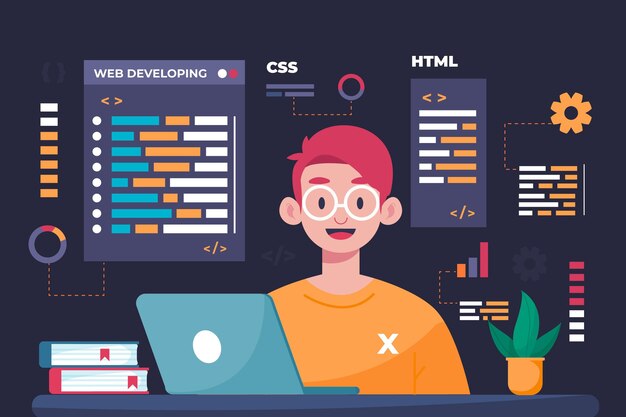
How to Land Your Dream Job as a Software Developer
Landing your dream job as a software developer requires a combination of skills, experience, and perseverance. Firstly, it is important to acquire a solid foundation in programming languages and software development principles.
This can be done through formal education, coding bootcamps, or self-learning. Additionally, gaining practical experience through internships, freelance projects, or contributing to open-source projects is crucial.
Networking and building connections within the industry can also increase your chances of finding your dream job. Finally, staying up-to-date with the latest trends and technologies in the field of software development is essential to remain competitive in the job market.
With the right combination of skills, experience, and determination, you can increase your chances of landing your dream job as a software developer.
How to Negotiate a Higher Software Developer Salary

Are you a talented software developer looking to maximize your earnings? Negotiating a higher salary is a crucial step in ensuring that you are fairly compensated for your skills and experience. Here's a guide on how to successfully negotiate a higher software developer salary.
1. Research Salary Benchmarks
Before entering into any negotiation, it is essential to have an understanding of the market value for your skills and experience as a software developer. Research salary benchmarks specific to your geographic location and industry to determine a realistic range for your desired salary. Websites like Glassdoor and Payscale can provide valuable insights into average salaries for software developers.
2. Understand Your Worth
Take the time to assess your unique skills, experience, and contributions. Consider your technical proficiency, the complexity of projects you have worked on, and any additional certifications or specialized knowledge you possess. Highlighting your value and the impact you can bring to the organization will strengthen your position during negotiations.
3. Build a Strong Case
Prepare a compelling case to support your request for a higher salary. Gather concrete evidence of your accomplishments, such as completed projects, positive feedback from clients or stakeholders, and any cost or time-saving initiatives you have implemented. Demonstrating the value you have added to previous or current employers will increase your credibility and justify your request for a higher salary.
4. Choose the Right Time
Timing is crucial when negotiating a salary increase. Ideally, initiate the conversation during your performance review or when discussing potential career advancement opportunities. This will ensure that your request is aligned with the company's evaluation of your performance and growth potential. Additionally, consider the financial health of the company and its ability to offer salary increases before discussing this topic.
5. Practice Effective Communication
Effective communication is key during a salary negotiation. Clearly articulate your achievements, skills, and the value you bring to the organization. Be confident but respectful in expressing your goals and aspirations. Additionally, actively listen to the employer's perspective and be open to compromise. Remember, salary negotiations are a two-way street, and both parties should feel satisfied with the outcome.
6. Consider Other Forms of Compensation
Keep in mind that salary is not the only form of compensation. Benefits like flexible working hours, additional vacation time, professional development opportunities, or stock options can also contribute to your overall compensation package. If the employer is unable to meet your desired salary, consider negotiating for these additional perks to enhance your overall job satisfaction and work-life balance.
7. Be Prepared to Walk Away
While negotiating a higher salary is important, it is equally important to know your limits. Understand your bottom line and be prepared to walk away if the employer is unable to meet your expectations. It is essential to value yourself and your skills and not settle for less than what you deserve.
The Ultimate Guide to Software Development: Everything You Need to Know

Software development is a booming industry that offers endless opportunities for career growth and innovation. Whether you're a tech enthusiast or simply curious about the field, this ultimate guide to software development will provide you with everything you need to know.
1. Understand the Basics: Software development is the process of creating computer programs or applications. It involves designing, coding, testing, and maintaining software systems. Familiarize yourself with programming languages like Java, Python, C++, or Ruby, as they form the foundation of software development.
2. Choose a Specialization: Software development is a vast field with various specializations. Some popular areas include web development, mobile app development, game development, and data science. Explore different specialties to find the one that aligns with your interests and career goals.
3. Learn Programming Languages: To become a proficient software developer, you need to acquire knowledge of programming languages. Start by learning a beginner-friendly language like Python, which has a simple syntax and wide application. As you progress, expand your repertoire by mastering more complex languages as per your chosen specialization.
4. Gain Problem-Solving Skills: Software development is all about solving problems. Develop your critical thinking and logical reasoning abilities to address complex issues efficiently. Practice algorithmic problem-solving and participate in coding competitions to enhance your problem-solving skills.
5. Get a Degree or Certification: While a formal education in software development is not always mandatory, obtaining a bachelor's or master's degree in computer science or a related field can give you an edge in the job market. If you prefer a more flexible and focused approach, consider pursuing industry-recognized certifications.
6. Build a Portfolio: Employers value practical experience, so it's crucial to showcase your skills through a portfolio. Develop personal projects, contribute to open-source initiatives, or collaborate on team projects to demonstrate your expertise. Your portfolio will act as tangible proof of your abilities to potential employers.
7. Stay Updated with the Latest Technologies: The software development industry evolves rapidly, with new frameworks, tools, and languages emerging frequently. Stay up-to-date by attending conferences, workshops, and online courses. Engage with developer communities and subscribe to relevant newsletters and blogs to stay ahead in this dynamic field.
8. Collaborate and Network: Software development often involves working in teams, so developing effective communication and collaboration skills is essential. Engage in open-source projects, join coding communities, and attend industry events to expand your network. Networking can provide valuable opportunities, job referrals, and mentorship.
9. Practice Continuous Learning: As a software developer, the learning process never ends. Stay curious and dedicate time to learning new technologies, methodologies, and best practices. Embrace new challenges and continuously strive to grow your skill set to adapt to the ever-changing tech landscape.
10. Gain Industry Experience: Once you feel confident in your skills, seek practical experience by applying for internships, entry-level positions, or freelance projects. Real-world experience will help you refine your skills, expose you to industry practices, and provide insights into working on large-scale software projects.
Remember, software development is a vast and constantly evolving field. Embrace a mindset of lifelong learning and adaptability to thrive in this ever-changing environment. With dedication, persistence, and passion, you can embark on an exciting and rewarding career in software development.


